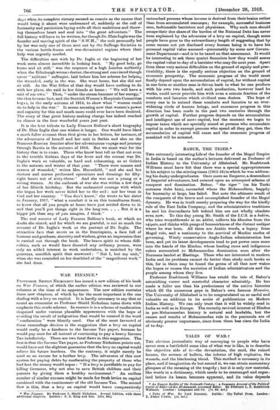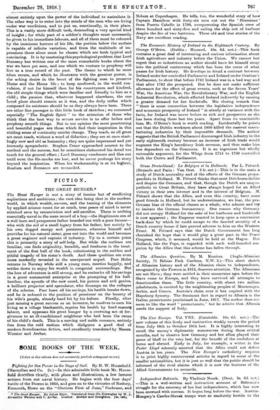TALES OF WAR. t
Tax obvious journalistic way of conveying to people who have never seen a battlefield some idea of what war is like, is to describe the objective side of it—the devastation, the mud, the ruined houses, the scream of bullets, the inferno of high explosive, the wounds, and the blackening blood. This method is necessary in its place, and if imagination do but amend it, we can attain momentary glimpses of the meaning of the tragedy ; but it is only raw material, like words in a dictionary, which needs to be rearranged and organ- ized before its lesson becomes apparent, and its value depends • An Empire Builder of the Sirkenth Century ; a Sunsmary decount of the Polities, Career of Zahir-nd-din Muhammad, surnamed Babas. By Professor L. F. aushbrook Williams. London : Longmans and Co. (7s. 0d. net.] f Tales of War. By Lord Dunsany. Dublin : The Talbot Prom London : T. Fisher raisin. Ps. net.] almost entirely upon the power of the individual to assimilate 4. The other way is to enter into the minds of the men who are living under war oonditions, and to put us, emotionally, in their place. This is a vastly more difficult task, demanding a very special kind of insight; for while part of a soldier's thoughts must necessarily be given to his immediate labours, and elf of _them must be coloured by the imminent horrors of his life, the portion below the surface is capable of infinite variation, and from the multitude of im- pressions those alone must be chosen which are both typical and convincing. It is by mastering this psychological problem that Lord Dunsany has written one of the most remarkable books about the war we have yet seen, and one which we venture to prophesy will live as a true record of the past. The theme to whioh he most often recurs, and which he illustrates with the greatest power, is the aching desire in the heart of the fighting man to preserve Home and the Home life ; to keep unaltered, in the world con- Vulsion, if not for himself then for his countrymen and kindred, the old simple things which were familiar and friendly to him as a child ; the passion that, whatever happened elsewhere, the one loved place should remain as it was, and the daily trifles which composed its existence should be as they always have been. There are other fine passages in this little book of sketches; we commend especially "The English Spirit" to the attention of those who think that the best way to secure service is to offer bribes and prophesy smooth things. But in our opinion the most penetrating and beautiful pages are those which find their inspiration in this abiding sense of continuity amidst change. They teach, as all great art must teach, without a word of didactics ; they are at once start- lingly new sad old as humanity ; they are quite impersonal and yet intensely sympathetic. Stephen Crane approached nearest to the method and the success, but he sometimes elaborated his detail too much for the general effect ; Lord Dunsany condenses and files out until even the file-marks are lost, and he never prolongs his story beyond the inspiration. When his workmanship is at its highest, Realism and Romance are reconciled.



























 Previous page
Previous page